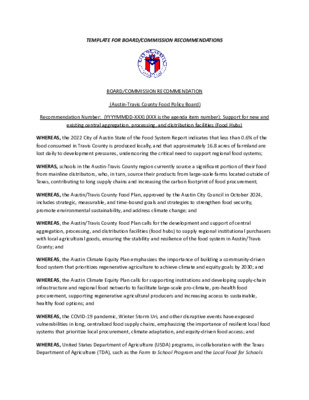Item 7. Food Goal 5 Food Hub Recommendation DRAFT — original pdf
Backup

TEMPLATE FOR BOARD/COMMISSION RECOMMENDATIONS BOARD/COMMISSION RECOMMENDATION (Austin-Travis County Food Policy Board) Recommendation Number: (YYYYMMDD-XXX) (XXX is the agenda item number): Support for new and existing central aggregation, processing, and distribution facilities (Food Hubs) WHEREAS, the 2022 City of Austin State of the Food System Report indicates that less than 0.6% of the food consumed in Travis County is produced locally, and that approximately 16.8 acres of farmland are lost daily to development pressures, underscoring the critical need to support regional food systems; WHERAS, schools in the Austin-Travis County region currently source a significant portion of their food from mainline distributors, who, in turn, source their products from large-scale farms located outside of Texas, contributing to long supply chains and increasing the carbon footprint of food procurement; WHEREAS, the Austin/Travis County Food Plan, approved by the Austin City Council in October 2024, includes strategic, measurable, and time-bound goals and strategies to strengthen food security, promote environmental sustainability, and address climate change; and WHEREAS, the Austin/Travis County Food Plan calls for the development and support of central aggregation, processing, and distribution facilities (food hubs) to supply regional institutional purchasers with local agricultural goods, ensuring the stability and resilience of the food system in Austin/Travis County; and WHEREAS, the Austin Climate Equity Plan emphasizes the importance of building a community-driven food system that prioritizes regenerative agriculture to achieve climate and equity goals by 2030; and WHEREAS, the Austin Climate Equity Plan calls for supporting institutions and developing supply-chain infrastructure and regional food networks to facilitate large-scale pro-climate, pro-health food procurement, supporting regenerative agricultural producers and increasing access to sustainable, healthy food options; and WHEREAS, the COVID-19 pandemic, Winter Storm Uri, and other disruptive events have exposed vulnerabilities in long, centralized food supply chains, emphasizing the importance of resilient local food systems that prioritize local procurement, climate adaptation, and equity-driven food access; and WHEREAS, United States Department of Agriculture (USDA) programs, in collaboration with the Texas Department of Agriculture (TDA), such as the Farm to School Program and the Local Food for Schools (LFS) Program, provide funding to support local food systems and school meal programs, benefiting farmers and communities; WHEREAS, local purchasing incentives for schools, such as the Local Food for Schools (LFS) Program, remain underutilized due to insufficient local food production and regional distribution capacity to meet the demand for school markets, and small, Central Texas farmers need technical assistance to scale up production and efficiently supply schools with fresh, healthy food; WHEREAS, a variety of local organizations, including non-profits, farmers, community groups, and institutional partners, are advancing regional food systems and food hub initiatives across Central Texas; WHEREAS, there is a significant opportunity to enhance collaboration among these efforts, fostering greater synergy and strengthening the regional food system to better meet the needs of the community. WHEREAS, the 2019 Central Texas Food Hub Feasibility Study, conducted by the Sustainable Food Center (SFC), identified significant potential for a regional food hub to facilitate the aggregation, processing, and distribution of locally grown food, while also highlighting challenges related to infrastructure, financing, and market access for local farmers; and WHEREAS, since the 2019 Central Texas Food Hub Feasibility Study, the Sustainable Food Center and the National Center for Appropriate Technology (NCAT) have facilitated matchmaking between producers and institutional buyers, creating a more robust farm-to-school network in the region; however, local purchasing incentives have primarily been spent on products produced outside of Travis County; WHEREAS, an updated assessment of food hub infrastructure and capacity is essential to identify gaps and opportunities, determine why local purchasing incentives have not significantly increased the procurement of regionally grown food, and guide future investments in food hubs and local food infrastructure, with a focus on community-based participatory research that actively involves local communities, farmers, and food access advocates in the process; WHEREAS, the 2019 feasibility study emphasized the need for collaboration between public and private sector entities to address these challenges, ensuring that the food hub serves the needs of both farmers and regional consumers, including underserved communities; and WHEREAS, The City is uniquely positioned to play a key role in coordinating regional food system efforts, ensuring broad stakeholder engagement, aligning food hub development with community needs and goals, and addressing emerging challenges in the food system; and NOW, THEREFORE, BE IT RESOLVED that the Austin-Travis County Food Policy Board encourages the Austin City Council to allocate funds for an updated assessment of existing food system infrastructure, using community-driven research to identify gaps, investment opportunities, and optimal solutions for strengthening the region’s food hub infrastructure and local food network. BE IT FURTHER RESOLVED that the Austin-Travis County Food Policy Board encourages the Austin City Council to facilitate regular stakeholder convenings as a neutral convener, including representatives from local farmers, food service institutions, food hubs, non-profits, community organizations, and other stakeholders, to develop a robust farm-to-institution network and ensure the alignment of local food infrastructure development with broader regional goals and community needs. Date of Approval: _____________________________ Record of the vote: (Unanimous on a 7-0 vote, 4-3 vote with names of those voting no listed) Attest: _____________________________________________ (Staff or board member can sign)